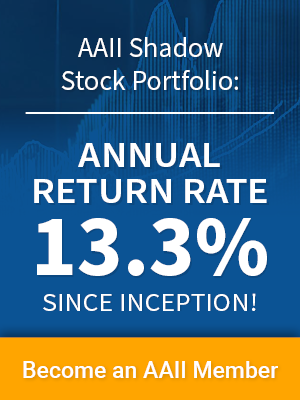Based on key financial metrics such as the price-to-sales ratio, shareholder yield and the price-earnings ratio, the following 3 stocks made the list for top value stocks in the Real Estate Management & Development industry. Those looking for value stocks to add to their portfolio may want to use this list as a starting point for further investment research.
Why Focus on Undervalued Real Estate Management & Development Stocks?
Value investors seek to buy stocks at a discount to their intrinsic value. Long-term returns show that such strategies are advantageous. Value stocks, as a group, tend to outperform growth stocks over extended periods of time. Typically, value investors perform financial analysis of numerous metrics, don’t follow the herd and are long-term investors.
AAII’s A+ Investor Value Grade is derived from a stock’s Value Score. The Value Score is the percentile rank of the average of the percentile ranks of the price-to-sales ratio, price-earnings ratio, enterprise-value-to-EBITDA (EV/EBITDA) ratio, shareholder yield, price-to-book-value ratio and price-to-free-cash-flow ratio. The score is variable, meaning it can consider all six ratios or, should any of the six ratios not be valid, the remaining ratios that are valid. To be assigned a Value Score, stocks must have a valid (non-null) ratio and corresponding ranking for at least two of the six valuation ratios.
What Goes Into AAII’s Value Grade?
Stock evaluation requires access to huge amounts of data as well as the knowledge and time to sift through it all, make sense of financial ratios, read income statements and analyze recent stock movement. AAII created A+ Investor, a robust data suite that condenses data research in an actionable and customizable way suitable for investors of all knowledge levels, to help investors with that task.
AAII’s proprietary stock grades come with A+ Investor. These offer intuitive A–F grades for more than just value. It is possible for a stock to appear cheap based on one valuation metric but appear expensive on another. It is also possible for one valuation ratio to be associated with outperforming stocks during certain periods of time but not others. Some stocks may even have null values for certain metrics like the price-earnings ratio or the price-to-book ratio but not others. An example of this would be a company with losses instead of profits or a negative book value because of heavy borrowing. Negative earnings or book value result in non-meaningful ratios that are left blank or null.
Click the button below to learn more about A+ Investor and subscribe today.

3 Undervalued Real Estate Management & Development Stocks
Of course, there are countless value stocks that are worth mentioning, but this is a concise list of the top 3 undervalued stocks in the Real Estate Management & Development industry for Tuesday, November 18, 2025. Let’s take a closer look at their individual scores to see how they measure up against each other and the Real Estate Management & Development industry median.
| Company | Ticker | Price/Sales | Price/Earnings | EV/EBITDA | Shareholder Yield | Price/Book Value | Price/Free Cash Flow | Value Grade |
| Cushman & Wakefield plc | CWK | 0.34 | 15.6 | 10.1 | (1.0%) | 1.75 | 20.8 | B |
| Forestar Group Inc. | FOR | 0.77 | 7.3 | 9.0 | (0.3%) | 0.71 | na | A |
| Five Point Holdings, LLC | FPH | 2.26 | 4.9 | na | (0.7%) | 0.55 | 2.1 | A |
The Value Grade is assigned based on how each stock’s composite valuation compares to all other stocks.
The process for assigning grades starts with each variable for a given stock. The percentile rankings for all valid ratios that a stock has are calculated. So, for instance, a stock could have a price-to-book ranking in the 43rd percentile, a price-earnings ranking in the 67th percentile, a price-to-sales ranking in the 23rd percentile, etc. Then, those rankings are averaged for each stock. (A minimum of two valid variables are required, though all six will be used if available.)
Once the average of the individual variables is calculated, that average is ranked against all stocks. Put another way, each stock’s composite valuation is compared to all other stocks. These ranks are then sorted into quintiles from the cheapest 20% (a grade of A) to the most expensive 20% (a grade of F).
As always, we recommend that you conduct proper due diligence and research before investing in any security. We also suggest that investors utilize numerous grades, not just value, when it comes to deciding whether a company is a good fit for their allocation needs.
Cushman & Wakefield plc’s Value Grade
Value Grade:
| Metric | Score | CWK | Industry Median |
| Price/Sales | 14 | 0.34 | 2.12 |
| Price/Earnings | 41 | 15.6 | 32.1 |
| EV/EBITDA | 35 | 10.1 | 18.3 |
| Shareholder Yield | 57 | (1.0%) | (0.6%) |
| Price/Book Value | 48 | 1.75 | 1.38 |
| Price/Free Cash Flow | 53 | 20.8 | 19.7 |
Cushman & Wakefield plc, together with its subsidiaries, provides commercial real estate services under the Cushman & Wakefield brand in the Americas, Europe, Middle East, Africa, and Asia Pacific. It offers integrated facilities management, project and development, portfolio administration, transaction management, and strategic consulting services; property management services, including client accounting, engineering and operations, lease compliance administration, project and development, tenant experience, residential property management, and sustainability services; self-performed facilities services, which include janitorial, maintenance, critical environment management, landscaping, and office services; and workplace and portfolio consulting services. The company also provides owner representation and tenant representation leasing services; capital market services, including investment sales and equity, and debt and structured financing for real estate purchase and sales transactions; and appraisal management, investment management, valuation advisory, portfolio advisory, diligence advisory, dispute analysis and litigation support, financial reporting, and property and/or portfolio valuation services on real estate debt and equity decisions. It serves real estate owners and occupiers, such as tenants, investors, and multinational companies. The company was founded in 1784 and is headquartered in Chicago, Illinois.
Stocks with a Value Score from 81 to 100 are considered deep value, those with a score between 61 and 80 are value and so on.
Cushman & Wakefield plc has a Value Score of 62, which is considered to be undervalued.
When you look at Cushman & Wakefield plc’s price-to-sales ratio at 0.34 compared to the industry median at 2.12, this company has a lower price relative to revenue compared to its peers. This could make Cushman & Wakefield plc’s stock more attractive for value investors.
Cushman & Wakefield plc’s price-earnings ratio is 15.60 compared to the industry median at 32.10. This means it has a lower share price relative to earnings compared to its peers. This could make Cushman & Wakefield plc more attractive for value investors.
Now, let’s assess Cushman & Wakefield plc’s EV/EBITDA ratio, also known as enterprise multiple. At 10.1, when compared to the industry median of 18.3, the company may be considered undervalued in relation to its peers. Value investors could use the enterprise multiple to identify stocks that are considered overvalued or undervalued relative to their industry.
Shareholder yield is the sum of a stock’s dividend yield (paid over previous 12 months minus special dividends) and the percentage of net share buybacks over the previous 12 months. Cushman & Wakefield plc’s shareholder yield is lower than its industry median ratio of (0.60%). Value investors may look for an attractive shareholder yield because it can be a powerful tool for identifying if the company has a good management team.
As one of the most common value metrics, the price-to-book ratio evaluates a company’s current market price relative to its book value. Cushman & Wakefield plc’s price-to-book ratio is higher than its industry median ratio of 1.38. This could make Cushman & Wakefield plc less attractive to investors looking for a new addition to their portfolio.
Lastly, let’s take a look at Cushman & Wakefield plc’s price-to-free-cash-flow ratio (P/FCF), which can indicate a company’s market value relative to its operating cash flow. Cushman & Wakefield plc’s price-to-free-cash-flow ratio is higher than its industry median ratio of 19.65. This could make Cushman & Wakefield plc less attractive because the higher P/FCF ratio indicates that Cushman & Wakefield plc is undervalued. The P/FCF ratio metric can also be viewed over a long-term time frame to see if the company's cash flow to share price value is generally improving or worsening.
Forestar Group Inc.’s Value Grade
Value Grade:
| Metric | Score | FOR | Industry Median |
| Price/Sales | 28 | 0.77 | 2.12 |
| Price/Earnings | 9 | 7.3 | 32.1 |
| EV/EBITDA | 29 | 9.0 | 18.3 |
| Shareholder Yield | 51 | (0.3%) | (0.6%) |
| Price/Book Value | 15 | 0.71 | 1.38 |
| Price/Free Cash Flow | na | na | 19.7 |
Forestar Group Inc. operates as a residential lot development company in the United States. The company acquires land and develops infrastructure for single-family residential communities. It sells its residential single-family finished lots to local, regional, and national homebuilders. The company was incorporated in 2005 and is headquartered in Arlington, Texas. Forestar Group Inc. operates as a subsidiary of D.R. Horton, Inc.
Stocks with a Value Score from 81 to 100 are considered deep value, those with a score between 61 and 80 are value and so on.
Forestar Group Inc. has a Value Score of 88, which is considered to be undervalued.
Forestar Group Inc.’s price-earnings ratio is 7.3 compared to the industry median at 32.1. This means that it has a lower price relative to its earnings compared to its peers. This makes Forestar Group Inc. more attractive for value investors.
Forestar Group Inc.’s price-to-book ratio is higher than its peers. This could make Forestar Group Inc. less attractive for value investors when compared to the industry median at 1.38.
You can read more about Forestar Group Inc.’s key financial metrics like shareholder yield, price-to-free-cash-flow and EV/EBITDA ratio, or learn more about its Momentum and Growth Grades, by subscribing to A+ Investor.
Five Point Holdings, LLC’s Value Grade
Value Grade:
| Metric | Score | FPH | Industry Median |
| Price/Sales | 54 | 2.26 | 2.12 |
| Price/Earnings | 4 | 4.9 | 32.1 |
| EV/EBITDA | na | na | 18.3 |
| Shareholder Yield | 55 | (0.7%) | (0.6%) |
| Price/Book Value | 9 | 0.55 | 1.38 |
| Price/Free Cash Flow | 4 | 2.1 | 19.7 |
Five Point Holdings, LLC designs, owns, and develops mixed-use planned communities in Orange County, Los Angeles County, and San Francisco County. The company operates through three segments: Valencia, San Francisco, and Great Park. It sells residential and commercial land sites to homebuilders, commercial developers, and commercial buyers by providing development management services; operates and owns a commercial office, research and development, medical campus, and other properties; and provides development and property management services. The company was formerly known as Newhall Holding Company, LLC and changed its name to Five Point Holdings, LLC in May 2016. Five Point Holdings, LLC was incorporated in 2009 and is headquartered in Irvine, California.
Stocks with a Value Score from 81 to 100 are considered deep value, those with a score between 61 and 80 are value and so on.
Five Point Holdings, LLC has a Value Score of 90, which is considered to be undervalued.
Five Point Holdings, LLC’s price-earnings ratio is 4.9 compared to the industry median at 32.1. This means that it has a lower price relative to its earnings compared to its peers. This makes Five Point Holdings, LLC more attractive for value investors.
Five Point Holdings, LLC’s price-to-book ratio is higher than its peers. This could make Five Point Holdings, LLC less attractive for value investors when compared to the industry median at 1.38.
You can read more about Five Point Holdings, LLC’s key financial metrics like shareholder yield, price-to-free-cash-flow and EV/EBITDA ratio, or learn more about its Momentum and Growth Grades, by subscribing to A+ Investor.

Other Real Estate Management & Development Stock Grades
Value is just one of the five Stock Grades included in our A+ Investor service. AAII members can see the top-graded stocks—those with grades of A or B for value, growth, momentum, earnings estimate revisions and quality—on the A+ Stock Grades Screener.
Also, if you want full access to all of AAII’s premium services, you can subscribe to one convenient bundled plan called AAII Platinum where you can try out A+ Investor, AAII Dividend Investing, the Stock Superstars Report, Growth Investing and VMQ Stocks. With the other premium services, you can dive deep into additional metrics, portfolios, commentary and information about Real Estate Management & Development stocks as well as other industrys.
Choosing Which of the 3 Best Real Estate Management & Development Stocks Is Right for You
Choosing which value stocks to invest in will ultimately depend on your individual goals and allocation; however, comparing similar value stocks in the same industry can help you analyze which might be better investments for you in the long run. So, let’s take a look at the Value Grade for all of our stocks.
- Cushman & Wakefield plc stock has a Value Grade of B.
- Forestar Group Inc. stock has a Value Grade of A.
- Five Point Holdings, LLC stock has a Value Grade of A.
Now that you have a bit more background about each of the 3 undervalued stocks in the Real Estate Management & Development industry as well as their overall grades, it’s time for you to conduct additional research to see if these could fit your portfolio needs based on your goals and risk tolerance. AAII can help you figure out both and identify which investments align with what works best for you.
We do so through a program of education that teaches you to invest for yourself and become an effective manager of your own wealth—no more relying on others for your financial independence. You can rely on AAII for timeless articles on financial planning and stock-picking, unbiased research and actionable analysis that makes you a better investor.
A+ Investor adds to that qualitative teaching by giving you a powerful data suite that helps you whittle down investment decisions to find stocks, exchange-traded funds (ETFs) or mutual funds that meet your needs.

Additional Resources About Real Estate Management & Development Stocks
Want to learn more about Real Estate Management & Development stocks to see if they could be the right investment for you? Check out some additional resources and articles to help you on your financial journey.
- 3 Undervalued Real Estate Management & Development Stocks for Tuesday, November 18
- 3 Undervalued Real Estate Management & Development Stocks for Friday, November 14
- Why LandBridge Company LLC’s (LB) Stock Is Up 5.07%
- Why Linkhome Holdings Inc.’s (LHAI) Stock Is Up 6.59%
AAII Disclaimer
We make no representations or warranties that any investor will, or is likely to, achieve profits similar to those shown, because past, hypothetical or simulated performance is not necessarily indicative of future results. Before making an investment decision, you should consider your circumstances and whether the information on our content is applicable to your situation. This information was prepared in good faith and we accept no liability for any errors or omissions. The full disclaimer can be read here.
 Included With AAII Platinum
Included With AAII Platinum
Yield Screen: 8.7% Compared to S&P 500
at only 6.9%
Since Inception. Data as of 12/31/2024.

769.3% Stock Superstars Portfolio Total Return Since Inception

U.S. Index ETF (IYY)
SSR Group 3 O'Shaughnessy portfolio has a 411.2% gain since inception performance compared to IYY at only 119.1%% Performance as of 11/29/24.
FREE REPORT

BECOME A MEMBER FOR ONLY $2
Get access to powerful investment discovery tools and a wealth of investment education to help you achieve your financial goals.




